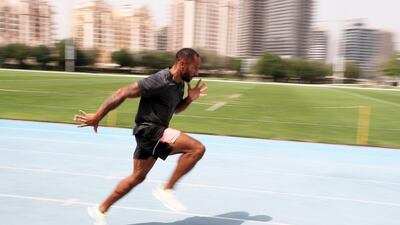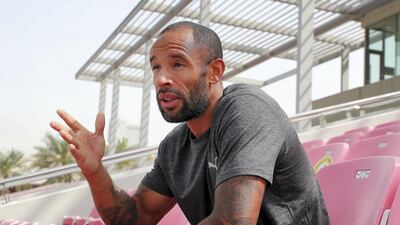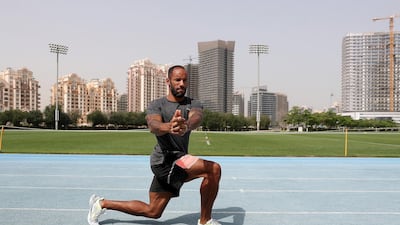As part of our build-up to the Tokyo Olympics we will be profiling Arab athletes and para-athletes, as well as those from the Mena region hoping to make it to this summer's Games
James Ellington is a twice an Olympian, twice winner of gold at the European Athletics Championships, and a Commonwealth Games silver medalist.
However, contesting a third Olympics will undoubtedly rank as the Dubai-based British sprinter’s most remarkable achievement to date.
Not because five years will have passed between Rio 2016 and Tokyo 2021, a longer-than-usual, pandemic-enforced stretch between Summer Games that must feel a lifetime in an athlete's relatively short career.
Not because, either, that Ellington is now 35, supposedly some way past his peak, his best days as a top-end 100-metre or 200-metre sprinter far behind and retirement beckoning.
What makes Ellington's story so compelling is that months after Rio and his fastest year in the sport, the London-born sprinter was involved in a road accident that threatened not only his career but his life.
In Tenerife in January 2017 for a warm-weather training camp, Ellington was riding a motorbike with fellow sprinter Nigel Levine when a car driven on the wrong side of the road struck them head on.
"Truly blessed to be alive", Ellington's injuries were severe. A fractured eye socket. A displaced pelvis, fractured also. The broken left ankle and fractured right tibia and fibula. The multiple lacerations, to the head, arms, legs and feet. Six pints of blood lost. Three surgeries. Six weeks in a wheelchair (initial prognosis was 12) and another six on crutches.
Running again was deemed highly improbable. Well, not quite by everyone.
"I know it sounds crazy, but I've always had the belief from the crash that I'd be back somehow," Ellington tells The National at Dubai Sports City before another training session and what he hopes is another step closer to Tokyo.
“I've always said that from the beginning. It's strange – I haven't done anything much different that I would’ve done before the crash in terms of training load or training stuff. I think maybe it's just more my mindset. I'm still dealing with the pain, but there's a different drive in me now.
“That's all I can put it down to. My mindset's completely different. Before, when I was running, you get caught up in, not being comfortable or complacent in the sport, but your mind gears towards different things. Like, ‘I need to run because I need to get this contract,’ or, ‘I want to do this because of that’.
“Whereas, where I think the slate got kind of wiped clean, it's almost reset me and put me back into the mode I had when I was a child and I started athletics. I just want to win.
“So now, when I'm training, I just want to beat everyone. That's probably what's caused me to feel like I'm better than I was before. And I think I am.”
Even still, the road back has been predictably tough. Alongside the physical fallout – the residual aches and pains, the joints seizing up following a particularly punishing session, the longer warm-ups, the 24-36 hours needed sometimes to rest and recover – he has learned to cope with the mental anguish.
Understandably, there have been periods of self-doubt; the questioning whether it’s all worth it.
“I think it's down to yourself, how difficult it is,” Ellington says. “It's you, really. It depends how you look at it. If I went back to the beginning of the crash and said, ‘Right, it's going to be four years on and you still won't have made it back to competing ...’
“Four years. That's a big chunk of a career, which most would say it was actually the end of my career at 31, because I was getting on.
“But the way I looked it, I was like, ‘All right’. In my mind, I've always thought I hit my peak when I crashed. I was at my peak; I had five [personal best times] that year. I was coming into the shape of my life.
“And then also, with the time off, I viewed it as a positive in terms of I've had four years to rest my central nervous system. So that's four years of not putting my body through the wringer. That's good recovery.
“I know people go, ‘You're crazy,’ but these are the kinds of things that have helped me get through it and make it an easier ride than it otherwise wouldn't have been. Because it is a tough ride. A tough ride, man. I understand that, but it depends on how you look at it.”
Ellington counts “six or seven” key people in his comeback.
His wife is most prominent; his mother; his mother- and father-in-law; a couple of close friends. Mike Burt, his strength and conditioning coach in the UK, and Florian Fritsch, a businessman whose financial support has been invaluable, especially through the bleakest times.
Each has helped Ellington climb free from the intermittent lows.
“It's just hard in general, I think,” he says when contemplating the hardest period of his recovery. “Looking too far ahead is something that's not good for me. In terms of training, I'm just taking every day as it comes.
“The tough days are for me when, if I've had a hard session, I go back and I'm messed up for 36 hours. And then I start, not questioning, but little doubts creep into your mind: ‘Is this good? Is this pain going to subside again?’ And it does subside. You just carry on going.”
He has been able to carry on by adapting. His training has been tailored, his pre- and post-workout routine, his running style. Some leg movement has been restricted; his pelvis is pinned together by metal.
There is help on the track as well. Ellington trains at Sports City with Dannish Walker-Khan, an ex-international sprinter, but has also found peace in working on his own. He sets up cameras to monitor the speed training, the burst from the blocks, any technical work.
Typically, Ellington would begin his season next month or in May, mainly in Europe, and work towards a qualifying time of 10.05 seconds, but the pandemic has made planning difficult.
He is set to travel to Bulgaria and then compete in the UK midway through next month, although the focus remains the National Championships in England in June.
That’s when Ellington aims to peak.
The delayed Olympics has been “a blessing in disguise”, allowing him an extra year to get his body ready. It simply would not have been last summer.
“The biggest obstacle getting there is just going to be the logistics of racing,” he says. “With Covid, it's going to be hard to get many races. And there's some weird selection things, with certain people able to take last season’s times as their times now.
“But if I'm in the shape that I'm going to be in, and there's not a crazy headwind in the national champs, I'll do everything there. I'll run the time and I'll get a position.”
Defying expectations has become a common theme. Not only in terms of conquering the physical and mental impact of the accident, but the financial, too.
Ellington’s superb 2016 had attracted a number of potential sponsorship deals for the following season, but they collapsed on that fateful day in Tenerife.
By the end of the year, the former two-time champion of the British Athletics Championships had lost all the monetary support provided by the UK athletics’ governing body.
“I was just like, ‘Oh, God. I've got no funding, I've got no wages, I've got no income. I've got nothing,” Ellington says.
Fortunately, he had some savings to keep him ticking over, while he received contributions from Fritsch whenever needed. The odd public-speaking role also helped.
“Literally for four years, I've been just keeping my head above the water, man,” Ellington says. “I've never been a money-money person anyway – as long as I can eat and I've got a roof over my head. I'm a simple person. But it will come back. If it's meant to come back, it will.”
Most probably, British Athletics didn’t believe it was possible for Ellington to come back. Still, the departure hurt.
“I've always been quite an outspoken kind of person, which some people like and some people don't,” he says. “And I don’t think the people that were controlling British Athletics at the time were really big fans of mine. It sounds mad, it sounds crazy, but it was almost like, ‘Right, that's it. We don't have to deal with him anymore’.
“It's funny, because obviously the guy that I crashed with, they kept him on funding and all the rest of it. He was the rider. So I was like, ‘I ain't going to feel sorry for myself. I'm just going to have to get on with it. It is what it is.’
“And I've always understood from the early days, as much as they'll make out that they care when you're running well and the rest of it, it's a business. When you're not performing or they don't have any use for you, then you get cut.”
Most would argue, though, that right after the accident is when Ellington needed them the most.
“Of course,” he says. “That was the time where actually, if we were such a great team and we were there for each other, they'd have been, ‘Right, we're going to do everything we can possible, within reason, to get you back, or to help you for the next couple of years.’
“They didn't. It was like a slap in the face. I've made so many teams. I've contributed so much towards the team. I've won medals for the team, and they just kind of abandoned me.”
Thankfully, the relationship has since improved. In September, Christian Malcolm was appointed head coach of the British Athletics Olympic Programme, the former sprinter whom Ellington considers a good friend.
He describes the chief executive installed last March, Joanna Coates, as “lovely”, while he enjoyed catching up with the team last year, when they transported to Dubai for a warm-weather camp.
“Everyone there now is just amazing,” he says.
Even if fences have been mended, the repercussions from the accident, the long road back and the perceived ill treatment undeniably fuel the fire.
Ellington says his greatest achievements have always been when people have doubted him, when he felt wronged or forgotten.
There is more than a nod to that spirit on the tattoo inked on his lower left leg a few months’ back, the only one sketched since the accident (Ellington’s arms are heavily embroidered). It depicts a ronin, the outcast samurai, who has to go it alone to ultimately prevail.
“It's kind of like a little bit of a representation of myself,” Ellington says, smiling.
It represents his attempt to reach a third Olympics, in what would surely constitute the finest feat in a career that took in London 2012 and Rio four years later; one that includes forming part of the gold medal-winning 4x100m relay teams at the 2014 and 2016 European Championships.
Ellington has worked hard towards Tokyo and never truly given up hope, overcoming obstacles and concentrating solely on competing at sport's pinnacle once more. He has dreamt it, often visualised it.
“Many times,” Ellington says. “I've seen it, seen what's going to happen. Without trying to sound like Mystic Meg, I've seen all of this stuff: I saw myself training again, saw myself running fast. I've seen myself competing. I've seen myself at the Olympics again.
“Visualisation, it's important. Everything starts in your mind before you can put into reality. So, I'm prepared. I've been through it a thousand times already in my head. I've pretty much hit all my goals along the way that I've said from the beginning, from the accident.
“This is the last one, the last thing to tick. You'll see me at the start line in Tokyo.”














